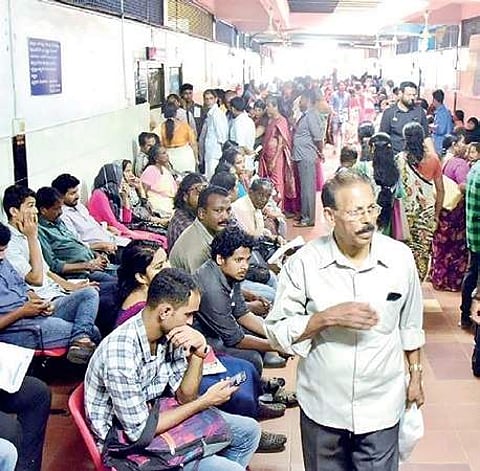

KOCHI: It is a canker on the efforts of the public healthcare system to keep epidemics at bay. The lackadaisical attitude in reporting contagious diseases sabotages the timely intervention in public healthcare creating a ‘data gap’ that affects planning, say public healthcare experts. At least 20 to 30 per cent data is missing from the official system because of the non-cooperation of a section of private hospitals, unenthusiastic government doctors and traditional healers. The quacks keeping away from the mainstream healthcare system adds to the mess.
“The main culprit is our outdated Public Health Act,” Planning Board member and public health activist Dr B Ekbal told Express. “There is no legal obligation in reporting and we have only weak measures to punish those who fail in their duties. We have two acts prevailing here - one for Travancore-Kochi and the other for Malabar. It is high time we changed to a unified one. We have proposals on the anvil.”
The lack of interest in reporting diseases will lead to the failure in spotting the outbreak of an epidemic. “For example, if a case of Hepatitis A has been found in a panchayat ward, we can test the water resources in the area and can adopt preventive measures even before the results of the tests on patients arrive,” said a doctor working in an area where a large number of dengue cases was reported this year.
“This is applicable in the case of diseases such as dengue. But a failure in reporting it will worsen the situation. Though bigger hospitals cannot be held liable for this, small hospitals and clinics account for a major share of the information as a large number of patients rely on them. In addition, a large number of traditional healers and even quacks attends to patients when there is an outbreak, especially fever,” the doctor said.
According to Ekbal, the failure in data collection became visible from the last quarter of the 90s. “With the number of patients with contagious diseases increasing, we could feel the difference in actual numbers as it came from the government sector only. We had a similar problem in calculating infant mortality during a period when the deliveries in private hospitals increased. But we fixed it soon. Nowadays, the births in private sector are recorded promptly in a proper manner,” he said.
However, there is an argument it is not the absence of data, but the lack of utilising it in a proper manner which is derailing the health programmes. “We have enough data available with the Health Department,” said Dr K P Aravindan, president of Kerala Sasthra Sahitya Parishad and an active campaigner in the public healthcare sector.
“However, it is lying idle due to the failure at the higher levels. We cannot call it the failure of a system as we never had a system in place,” he said. He termed the visits by fact-finding Central teams after the outbreak of a disease as a farce.
“Have you ever found any Central team arriving at a proper solution after their brief visit? It is a farce when we have enough experts in microbiology and epidemiology. However, we fail to utilise their capacity,” he said.
According to Aravindan, increasing the surveillance system and setting up two virology centres in the state can improve the public health sector a lot. “Health intelligence gathering on epidemics and other diseases is almost similar to regular intelligence gathering. However, we are not anywhere in the picture in this regard,” he said.
Aravindan said underutilisation of resources is another major failure. “We have a virology institute in the state which is almost defunct.
The state has another offer from the Union Government for two virology centres at the medical colleges - one at Kozhikode and the other at Thiruvananthapuram. It will be funded by DHR and will be under the guidance of ICMR. If the state takes the initiative to implement both, it will be ready within six months,” he said.
The visits by fact-finding Central teams after the outbreak of diseases are being dubbed a farce
The lackadaisical attitude of hospitals in sharing data on diseases and underutilisation of resources throw a spanner in the works of the Health Dept in keeping epidemics at bay
The lack of interest in reporting diseases will lead to the failure in spotting the outbreak of an epidemic
20-30% data is missing from the official system
“The failure in data collection became visible from the last quarter of the 90s” - Dr B Ekbal